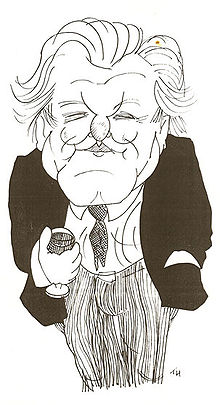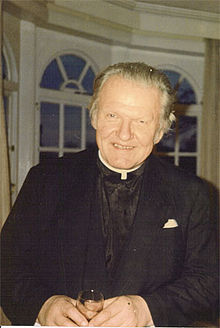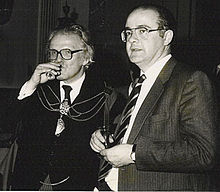- Derek Pattinson
-
Sir William Derek Pattinson (31 March 1930 – 10 October 2006) was Secretary-General of the General Synod of the Church of England from 1972 until 1990.
Contents
Life
Early years
Pattinson was born at Barrow-in-Furness, the only child of Thomas William Pattinson (1898–1970) a civil servant and Elizabeth Pattinson née Burgess (1895–1986) a primary school teacher. He was educated at the County Grammar School, Whitehaven and at The Queen's College, Oxford, where, despite having won the Stanhope Historical Essay Prize, he obtained only Second Class in the Final Honour School of Modern History. He received the degree of Bachelor of Arts in 1952 and Master of Arts in 1956. He had been a member of the Church of England since his childhood but during his time at Oxford he moved from the Low Church to Anglo-Catholicism.[1] An alternative version states that he grew up an Anglo-Catholic, that his religious enthusiasm waned at Oxford, and that he returned to the Church when as a civil servant.[2] He entered HM Civil Service, working in the Inland Revenue from 1952 until 1962 and HM Treasury from 1962 until 1965, returning in 1965 as Assistant Secretary in the Inland Revenue, and transferring back to HM Treasury in 1968.
General Synod
In 1970 Gerald Ellison, then Bishop of Chester, suggested that he should apply for the position of Associate Secretary-General of the General Synod of the Church of England,[2] with the intention that, if appointed, he should succeed as Secretary-General on the retirement of Sir John Scott. He was appointed to the Associate's position and he was Secretary-General from 1972 until 1990. It is said that he enjoyed better relations with the Anglo-Catholic archbishops Michael Ramsey and Robert Runcie than he did with the evangelical Donald Coggan, for reasons of both Churchmanship and administrative style.[2][3]
He was not enthusiastic about the ordination of women but regarded it as inevitable and was quite happy with women priests when they were eventually ordained. He was a keen promoter of black and other ethnic minority members of the Synod. He was also a key figure in the establishment of the Diocese of Gibraltar in Europe.[2]
He was first touched by scandal in 1987 in connection with the Preface to Crockford's Clerical Directory, written anonymously by his friend The Revd Canon Gareth Bennett, Dean of Divinity of New College, Oxford, who committed suicide as a result of the controversy it caused. Pattinson was responsible for commissioning the Preface and was thought to have failed to predict the outcome of publishing it. The Standing Committee of the General Synod decided that he was without blame in the incident.[4]
Shortly before his retirement in 1990 he was appointed Knight Bachelor by HM The Queen in the Queen's Birthday Honours,[5] and he received the accolade on 6 November 1990.[6] At this point he was thinking about ordination and, since Church of England clergymen are not allowed to receive the accolade, it has been suggested that it was impolitic of him to accept the honour.[1] However correspondence with Buckingham Palace in November 1991 accepted Sir Derek's use of the accolade without setting a precedent for others.
A less formal honour marking his retirement was the singing, in the General Synod, of a variation on the Major-General's Song from The Pirates of Penzance with the line, "He was the very model of a Secretary-General".[3]
Despite not having attended a bishops' selection conference, he was accepted for ordination.[7] He trained for two terms at St Deiniol's Library and was ordained deacon in 1991 by Graham Leonard. The service was threatened with interruption by a journalist from The Daily Mail who wanted to know whether Sir Derek was gay.[1] Following a further term at the College of the Resurrection he was ordained priest in 1992 by David Hope. Both services took place at St Gabriel's Church in Pimlico, in central London where he was Non-Stipendiary Minister from 1991 until 2000.
On 30 November 1992 Barnaby Miln - a homosexual activist, Justice of the Peace, and former member of the House of Laity of the General Synod of the Church of England - was asked to afternoon tea with Bishop of London who asked about Sir Derek’s drinking problem following reports he had received. They agreed, that for the sake of Barnaby Miln's well being, he and Sir Derek should no longer live together. The Bishop thanked Barnaby Miln for looking after Sir Derek and assisted him in finding alternative accommodation. The Bishop arranged that Barnaby Miln take Sir Derek on 1 December 1992 to a consultant in Harley Street in the expectation that he would be sent to a clinic for specialist treatment. The Consultant failed to persuade Sir Derek who, the following day, attended a local clergy chapter at Westminster Abbey which happened to be attended by the Bishop. Seeing the state he was in, on 3 December 1992 the Bishop wrote to Sir Derek suspending his License for an initial period of six weeks.
On 4 December 1992 The Independent claimed that Sir Derek had been living with Barnaby Miln.[8]
Barnaby Miln returned in September 2000 to live with and care for Sir Derek whose health had deteriorated. In the last edition of Who's Who published before Sir Derek's death Barnaby Miln was named as his partner,[3] and was the executor of his Estate.
Death and legacy
Sir Derek was diagnosed with hydrocephalus in 2000. He died in London on 10 October 2006 and his ashes are buried in Westminster Abbey. He had held numerous other appointments including membership of the Archbishops' Commission on Church and State (1966–70) and the British Council of Churches (1972–90), the vice-chairmanship of the Grosvenor Chapel Committee (1973–81), the chairmanship of Liddon Trustees (1972–2001), the William Temple Association, and of the English Friends of the Anglican Centre in Rome (1985–2001), and the principalship of the Society of the Faith (1992–2001). He was Churchwarden of St Michael's, Cornhill and Parish Clerk of St Luke's, Old Street. He was also a Freemason and a member of the Athenaeum Club and the Savile Club.[1] He became a Freeman of the City of London in 1973 and was a member of the Woolmen's Company and of the Parish Clerks' Company, of which he was Master 1986/7.
References
- ^ a b c d Michael De-la-Noy, 'The Rev Sir Derek Pattinson', The Independent, 17 October 2006
- ^ a b c d Margaret Duggan, 'The Rev Sir Derek Pattinson', The Guardian, 16 October 2006
- ^ a b c 'The Rev Sir Derek Pattinson', The Telegraph, 14 October 2006
- ^ For details of the Crockford Affair see obituaries, passim, and Michael De-la-Moy, The Church of England: A Portrait (London: Simon & Schuster, 1993), pp. 240-1, as well as the article on Gareth Bennett.
- ^ London Gazette: no. 52173. p. 2. 15 June 1990. Retrieved 2008-03-20.
- ^ London Gazette: no. 52543. p. 8207. 28 May 1991. Retrieved 2008-03-20.
- ^ Michael De-la-Moy, The Church of England: A Portrait (London: Simon & Schuster, 1993), p. 331
- ^ Barnaby Miln http://web.mac.com/barnabymiln/Site/Homepage.html
Further reading
- Debrett's People of Today (12th edn, London: Debrett's Peerage, 1999), pp. 1516–17
- Crockford's Clerical Directory (97th edn, London: Church House Publishing, 2001), p. 576
- Michael De-la-Moy, The Church of England: A Portrait (London: Simon & Schuster, 1993)
External links
- 'The Rev Sir Derek Pattinson', The Times, 14 October 2006
- 'The Revd Sir Derek Pattinson RIP', The Church of England, 13 October 2006
- Jennifer Gold, 'Church of England Mourns Death of Sir Derek Pattinson', Christian Today, 14 October 2006
Categories:- 1930 births
- 2006 deaths
- Alumni of The Queen's College, Oxford
- Anglicanism
- Anglo-Catholics
- LGBT Christians
- Church of England clergy
- English Anglican priests
- Knights Bachelor
- LGBT clergy
- People from Barrow-in-Furness
Wikimedia Foundation. 2010.



